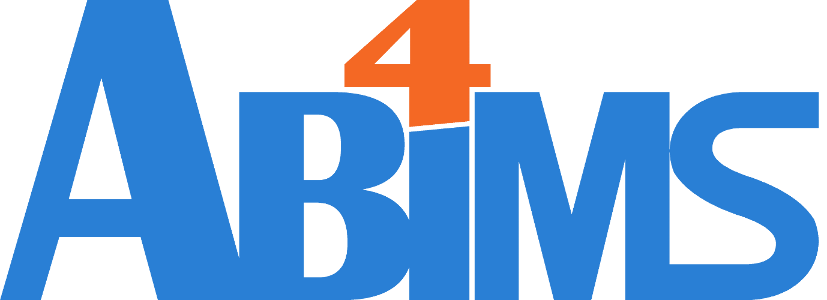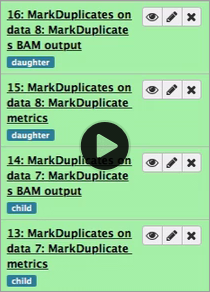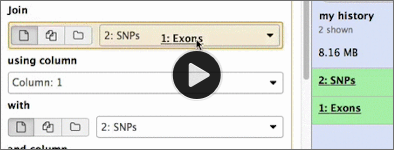August 2017 Galaxy News
 ](/galaxy-updates/)
](/galaxy-updates/)
Welcome to the August 2017 Galactic News, a summary of what is going on in the Galaxy community. If you have anything to add to next month's newsletter, then please send it to outreach@galaxyproject.org.
GCC2018: Portland, Oregon, United States, June 25-30
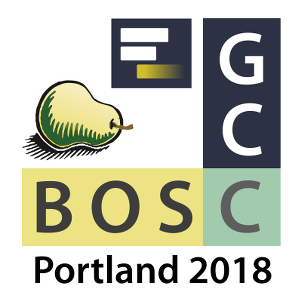 ](https://gccbosc2018.sched.com/)
](https://gccbosc2018.sched.com/)
We are pleased to announce that the 2018 Galaxy Community Conference (GCC2018) and the Bioinformatics Open Source Conference 2018 (BOSC2018) are joining together for a unified event to be held in Portland, Oregon, United States, June 25-30, 2018. The event will feature two days of training, a two day meeting, and finish with two days of intense collaboration at the OBF Codefest, and Hack the Galaxy: Dev and Data. The meeting will feature joint and parallel sessions, and shared keynotes, poster and demo sessions, and social events. Colocating GCC and BOSC will bring together the widest possible community of bioinformatics developers and practitioners into a single place. At this event the whole will be greater than the sum of the parts.
The event is organized by Oregon Health & Science University (OHSU) and will be held at Reed College, a small liberal arts college in Portland. Portland is a vibrant city in the American Northwest, close to the Cascade Mountains, the Oregon Coast, and the Columbia River.
GCC2017 is Done!
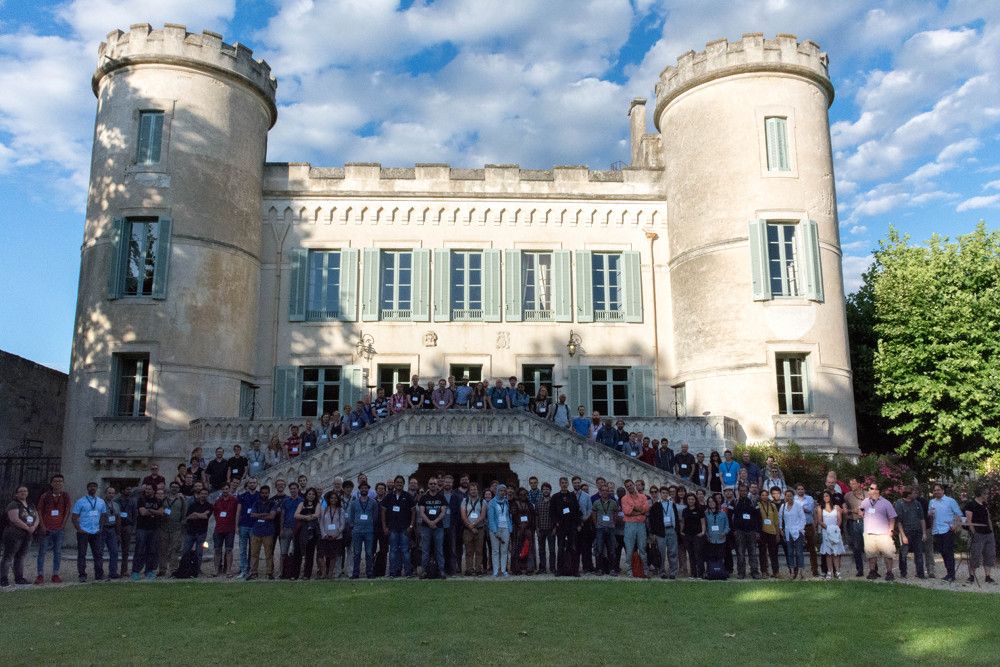 ](https://gcc2017.sciencesconf.org/)
](https://gcc2017.sciencesconf.org/)
[Photo](https://www.flickr.com/photos/134305289@N03/34817510423/in/album-72157685584858176/): [Bérénice Batut](https://www.flickr.com/photos/134305289@N03/albums/72157685584858176)
[
 ](https://blog.f1000.com/2017/07/31/intergalactique-the-galaxy-community-conference-2017/)
](https://blog.f1000.com/2017/07/31/intergalactique-the-galaxy-community-conference-2017/)
GCC2017 was held 26-30 June in Montpellier, France. The eighth global gathering of the Galaxy community featured two days of Hack the Galaxy, two days of training, and a two day community conference. Most training materials, slides, and posters are now available online. Slides and posters are also being uploaded to the F1000 Galaxy Channel. Take a look.
Two summaries of GCC2017 are available online:
- Intergalactique – the Galaxy Community Conference 2017, by Hollydawn Murray, F1000 Research Publishing Editor, on the F1000 Research Blog.
- Trip Blog, by Simon Gladman, Research Scientist specialising in microbial genomics, Melbourne Bioinformatics.
[
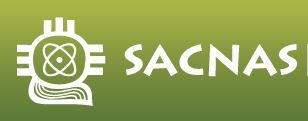 ](/events/2017-sacnas/)
](/events/2017-sacnas/) [
 ](https://software-carpentry.org/)
](https://software-carpentry.org/)[
 ](https://data-carpentry.org/)
](https://data-carpentry.org/)[
 ](https://www.cyverse.org/)
](https://www.cyverse.org/)[
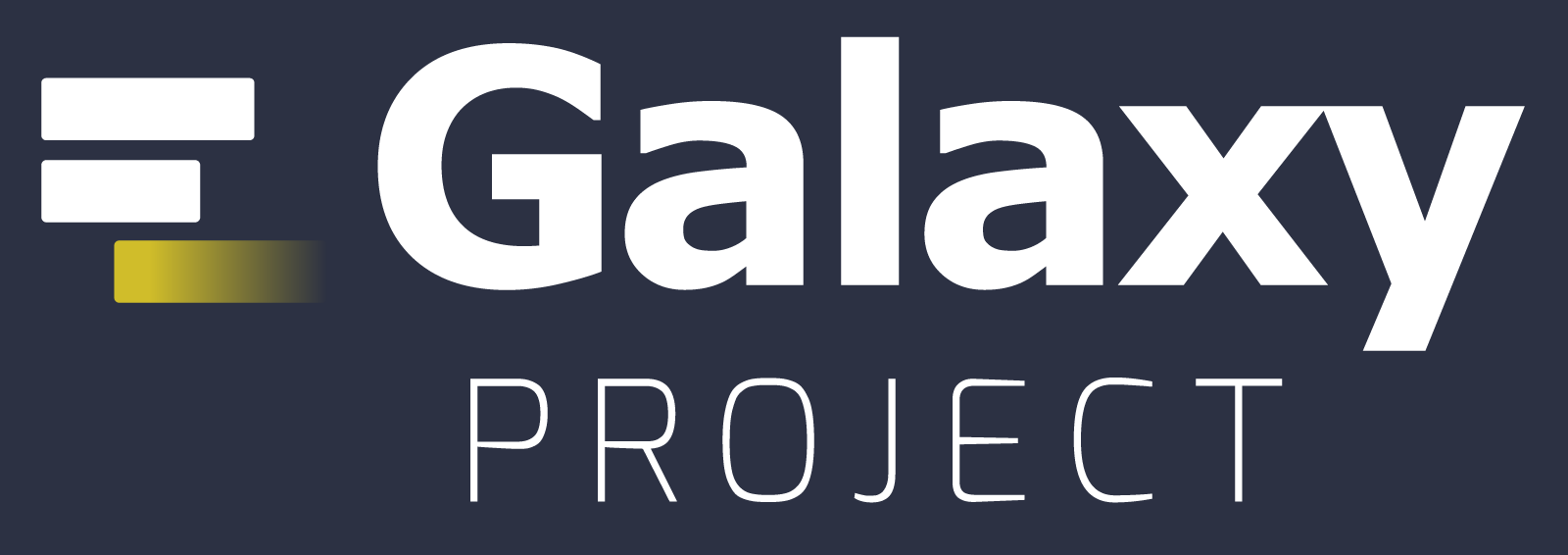 ](/)
](/)
Galaxy (and CyVerse and the Carpentries) at 2017 SACNAS Meeting
If you are attending the 2017 SACNAS meeting in Salt Lake City in October, then please consider signing up for one of these preconference workshops:
Data Platforms for Life Science Researchers
Registration is free but space is limited. You are strongly encouraged to register soon. Both workshops are held October 18, the day before SACNAS starts.
Plese note: The Galaxy Community Fund is augmenting SACNAS Travel Scholarships awards for the first ~ 28 scholarship recipients that register for these workshops. The additional funds will cover an extra night's lodging for scholarship recipients, enabling you to arrive the day before the workshops. Funds are limited, and once the funds are allocated, they are gone. (You must hve received a SACNAS Travel Scholarship to be eligible.)
Galaxy @ ISMB/ECCB/BOSC 2017: Slides and posters are available
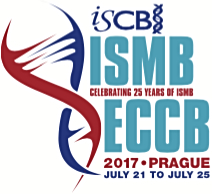 ](/events/2017-ismb-bosc/))
](/events/2017-ismb-bosc/))
If you missed all the Galaxy @ ISMB/ECCB 2017 & BOSC 2017 then don't, um, fret! Most slides and posters are available online)
See you next year in Chicago!
All events
There are a plenitude of Galaxy related events coming up in the next few months:
See the Galaxy Events Google Calendar for details on other events of interest to the community.
New Publications
298 new publications referencing, using, extending, and implementing Galaxy were added to the Galaxy CiteULike Group in June and July.
Some highlights from the recently added publications:
- Create, run, share, publish, and reference your LC–MS, FIA–MS, GC–MS, and NMR data analysis workflows with the Workflow4Metabolomics 3.0 Galaxy online infrastructure for metabolomics Yann Guitton, Marie Tremblay-Franco, Gildas Le Corguillé, et al. The International Journal of Biochemistry & Cell Biology (July 2017), doi:10.1016/j.biocel.2017.07.002
- Workflow Integration and Orchestration, Opportunities and the Challenges G. Kousalya, P. Balakrishnan, C. Pethuru Raj. In Automated Workflow Scheduling in Self-Adaptive Clouds (2017), pp. 137-156, doi:10.1007/978-3-319-56982-6_8
- The RNA workbench: best practices for RNA and high-throughput sequencing bioinformatics in Galaxy Björn A. Grüning, Jörg Fallmann, Dilmurat Yusuf, et al. Nucleic Acids Research, Vol. 45, No. W1. (03 July 2017), pp. W560-W566, doi:10.1093/nar/gkx409
- RNA-bioinformatics: Tools, services and databases for the analysis of RNA-based regulation Rolf Backofen, Jan Engelhardt, Anika Erxleben, et al. Journal of Biotechnology (May 2017), doi:10.1016/j.jbiotec.2017.05.019
- Assessing therapeutic potential of molecules: molecular property diagnostic suite for tuberculosis (MPDSTB) AnamikaSingh Gaur, Anshu Bhardwaj, Arun Sharma, et al. Journal of Chemical Sciences, Vol. 129, No. 5. (2017), pp. 515-531, doi:10.1007/s12039-017-1268-4
- Computational Generation of RNA Nanorings Rishabh Sharan, Eckart Bindewald, WojciechK Kasprzak, BruceA Shapiro; edited by Eckart Bindewald, Bruce A. Shapiro. In RNA Nanostructures, Vol. 1632 (2017), pp. 19-32, doi:10.1007/978-1-4939-7138-1_2
- Globus: A Case Study in Software As a Service for Scientists Bryce Allen, Rachana Ananthakrishnan, Kyle Chard, et al. In Proceedings of the 8th Workshop on Scientific Cloud Computing (2017), pp. 25-32, doi:10.1145/3086567.3086570
- Demonstrating Distributed Workflow Computing with a Federating Wide-Area File System Philip D. Blood, Anjana Kar, Jason Sommerfield, Beth L. Eicher, Richard Angeletti, J. Ray Scott. In Proceedings of the Practice and Experience in Advanced Research Computing 2017 on Sustainability, Success and Impact (2017), doi:10.1145/3093338.3093389
- Customized workflow development and data modularization concepts for RNA-Sequencing and metatranscriptome experiments Steffen C. Lott, Markus Wolfien, Konstantin Riege, et al. Journal of Biotechnology (July 2017), doi:10.1016/j.jbiotec.2017.06.1203
- TAREAN: a computational tool for identification and characterization of satellite DNA from unassembled short reads Petr Novák, Laura Ávila Robledillo, Andrea Koblížková, Iva Vrbová, Pavel Neumann, Jiří Macas. Nucleic Acids Research, Vol. 45, No. 12. (07 July 2017), pp. e111-e111, doi:10.1093/nar/gkx257
- proFIA: A data preprocessing workflow for Flow Injection Analysis coupled to High-Resolution Mass Spectrometry Alexis Delabrière, Ulli M. Hohenester, Benoit Colsch, Christophe Junot, François Fenaille, Etienne A. Thévenot. Bioinformatics (2017), doi:10.1093/bioinformatics/btx458
Publication Topics
| # | Tag | # | Tag | # | Tag | # | Tag | |||
|---|---|---|---|---|---|---|---|---|---|---|
| 167 | methods | 55 | workbench | 55 | usepublic | 35 | usemain | |||
| 20 | uselocal | 20 | isgalaxy | 19 | refpublic | 16 | tools | |||
| 15 | reproducibility | 9 | cloud | 8 | other | 7 | unknown | |||
| 4 | shared | 2 | howto | 1 | visualization | 1 | usecloud |
Who's Hiring
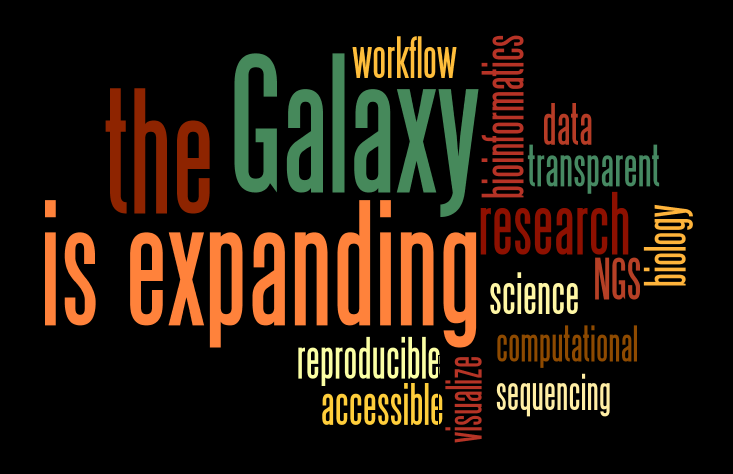 ]
]The Galaxy is expanding! Please help it grow.
- Ingénieur spécialisé en NGS, BIOGECO, Bordeaux, France
- Ingénieur web et bases de données pour les analyses métagénomiques des écosystèmes fromagers, Micalis / MaIAGE, Jouy-en-Josas, France
- Développeur d’outils MS/MS pour le projet Workflow4Metabolomics sous Galaxy, Station Biologique de Roscoff, France
- Bioinformatics Research Associate, Huttenhower Lab, Harvard School of Public Health, Boston, Massachusetts, United States
- Scientific Research Programmer, Sethuraman Lab, California State University San Marcos. Develop model-based population genomics pipelines.
Got a Galaxy-related opening? Send it to outreach@galaxyproject.org and we'll put it in the Galaxy News feed and include it in next month's update.
Public Galaxy Server News
There are over 90 publicly accessible Galaxy servers and six semi-public Galaxy services. Here's what happened with them in May
Galaxy Integrated Omics (GIO)
- A two minute demo of the mzIdentML visualisation plugin that runs in the Galaxy Integrated Omics (GIO) is now available.
Usegalaxy.org
- Jupyter Interactive Environments now run on Jetstream cloud via Docker Swarm and Galaxy Swarm Manager.
New Public Galaxy Servers
ABiMS
ABiMS Galaxy supports general purpose genomics analysis, featuring many standard tools plus many additional tools. However, we are specialized in RNASeq with reference and de novo RNASeq. Anyone with a professional/institutional email address can request an account. The server is only available for registered users, and the default quota for new users is 20GB but can be extended on request. [Email support](mailto:support DOT abims AT sb-roscoff DOT fr) is available. ABiMS is supported by CNRS, UPMC, BioGenOuest, IFB, and Station Biologique de Roscoff
Tools
ToolShed Contributions
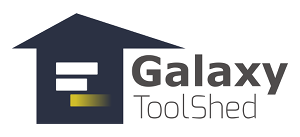 ](http://toolshed.g2.bx.psu.edu/)
](http://toolshed.g2.bx.psu.edu/)Tool Shed contributions from June and July.
Releases
Galaxy TourBuilder
The Galaxy TourBuilder records your Galaxy analysis in real-time and creates a Galaxy Tour for you - automatically! You can edit the tour simultanously, replay the tour while you are analysing your data and much more!
Check out the video to get a taste of what it can do for you.
This extension is available under the name Galaxy Tour Builder in the Chrome Web Store, the Mozilla (Firefox) Add-on website, and the Opera add-ons website. Credits
This project was initiated during the Swiss-Germany Galaxy Days a while ago in Freiburg by Dannon Baker and William Durand. During GCC 2017 Florian Eggenhofer, Matthias Bernt, Bérénice Batut and Clemens Blank have picked up this project and with tramendous help from TailorDev so a first version could be released.
Planemo 0.41.0 - 0.44.0
 ](https://pypi.python.org/pypi/planemo/)
](https://pypi.python.org/pypi/planemo/)Planemo is a set of command-line utilities to assist in building tools for the Galaxy project. These releases included numerous fixes and enhancements.
See GitHub for details.
galaxy-lib 17.9.0-3
galaxy-lib is a subset of the Galaxy core code base designed to be used as a library. This subset has minimal dependencies and should be Python 3 compatible. It's available from GitHub and PyPi.
This set of revisions includes:
- Bring in latest Galaxy dev changes.
- Implement support for building Singularity mulled containers.
- Implement mulled version 2 package hashing.
- Fix default namespace for mulled operations from mulled to biocontainers.
gops 1.1.0
The Galaxy Operations Python Package now provides utilities for working with GFF files thanks to @bgruening and @nsoranzo.
Earlier Releases
Other packages that have been released in the prior 4 months.
May 2017 Galaxy Release (v 17.05)
The Galaxy Committers published the 17.05 release of Galaxy in May.
Tag your data with propagating hashtags
- Large Galaxy histories used to be messy. Hashtags make it easy to track dataset (and collection) relationships.
- These two movies (both under a minute) explain how to use this with datasets and with collections.
- Learn more about Galaxy histories in our updated tutorial.
Drag & Drop datasets into tool inputs
- Interface now allows dragging datasets from history panel into the content selectors of the tool form.
- Implemented in Pull Request 3871.
Upload directly to a collection
- You can now bypass the history manipulation and upload your data straight into a collection for convenience.
- Learn more about collections and how to use them in a new tutorial.
We extend special thanks to the 64 New Contributors to Galaxy in the past year.
Additionaly there are New Configuration Options and New Datatypes sections.
Galaxy Docker Image 17.05
The Galaxy Docker project has seen a new release, following Galaxy 17.05. Major features are an additional Docker compose setup with SLURM and HT-Condor deployments, BioContainers integration and much more automatic testing.
And
- The Galaxy Docker Project has reached more than 23k downloads on Dockerhub - not counting quay.io and all flavors
-
From John Chilton:
- Awesome new mode for docker-galaxy-stable by Björn Grüning: container scheduling with Condor
Parsec 1.0.0 - 1.0.2
Parsec is a newly released set of command-line utilities to assist in working with Galaxy servers. It uses automatically generated wrappers for BioBlend functions. Manage histories, launch workflows, and more, all from the command line. The README includes several examples.
BioBlend 0.9.0
BioBlend is a Python library for interacting with CloudMan and Galaxy‘s API. BioBlend makes it possible to script and automate the process of cloud infrastructure provisioning and scaling via CloudMan, and running of analyses via Galaxy.
See the release notes for what's new in release 0.9.0.
Galaxy CloudMan 17.05 on AWS
A new release of Galaxy CloudMan is available on the Amazon Web Services cloud infrastructure. This release includes Galaxy 17.05, an updated tool list, and Slurm configuration changes to improve job performance. To get started, vist https://beta.launch.usegalaxy.org/ or take a look at the Getting Started guide.
CloudLaunch
Technically, the all-new Galaxy CloudLaunch service has been in public beta since February but keep in mind that it will replace the current CloudLaunch service eventually so give it a try and let us know how it performs for you.
CloudBridge 0.2.0
CloudBridge aims to provide a simple layer of abstraction over different cloud providers, reducing or eliminating the need to write conditional code for each cloud. It is currently under development and is in an Alpha state. Release 0.2.0 includes several fixes and enhancements.
And the rest ...
Other Galaxy packages that haven't had a release in the past four months can be found on GitHub.
Other News
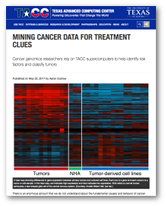 ](https://www.tacc.utexas.edu/-/mining-cancer-data-for-treatment-clues)
](https://www.tacc.utexas.edu/-/mining-cancer-data-for-treatment-clues)- Mining cancer data for treatment clues: Cancer genomics researchers rely on TACC supercomputers to help identify risk factors and classify tumors
- Five years of Galaxy-P!
- A plugin framework for Galaxy tool error handling (work-in-progress) by Helena Rasche.
- A Galaxy docker container with R markdown based Galaxy tools installed. This Docker image is used as a demonstration to show how to use R markdown as a unified framework for Galaxy tool development.
- From John Chilton: A cool outcome from our GCC hackathon - support for Galaxy tool localization (work in progress).
- From Mallory Freeberg: Differential abundance testing of small RNAs tutorial
- From Enis Afgan: First launch of #usegalaxy on Microsoft #Azure! A huge thanks to RC Carter and Elizabeth Bruce for setting the wheels in motion.) A huge thanks to RC Carter and Elizabeth Bruce for setting the wheels in motion.

